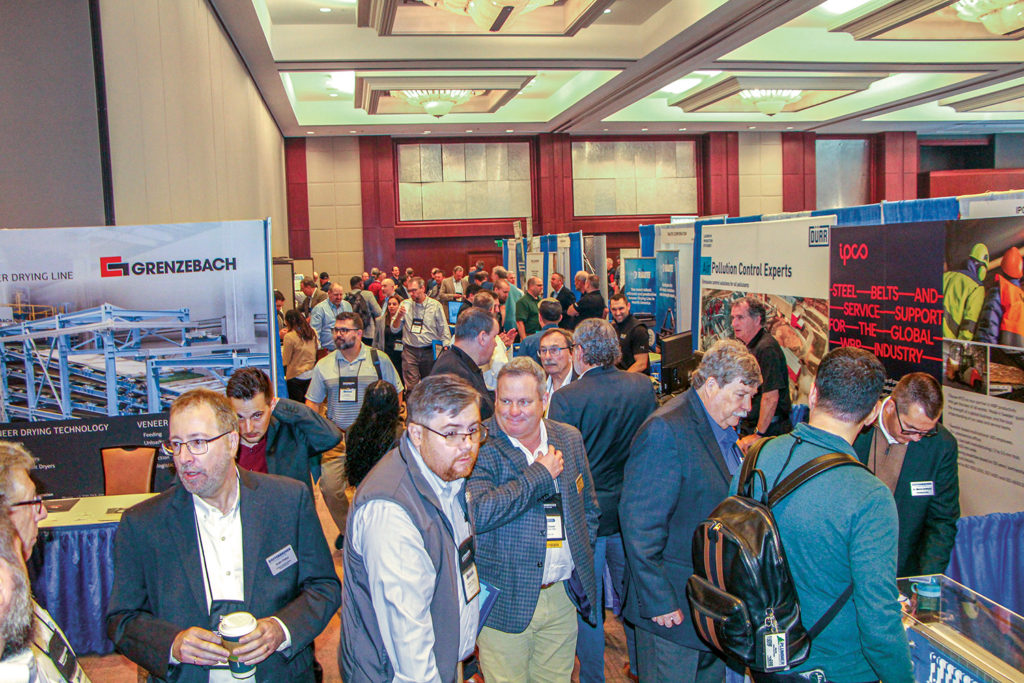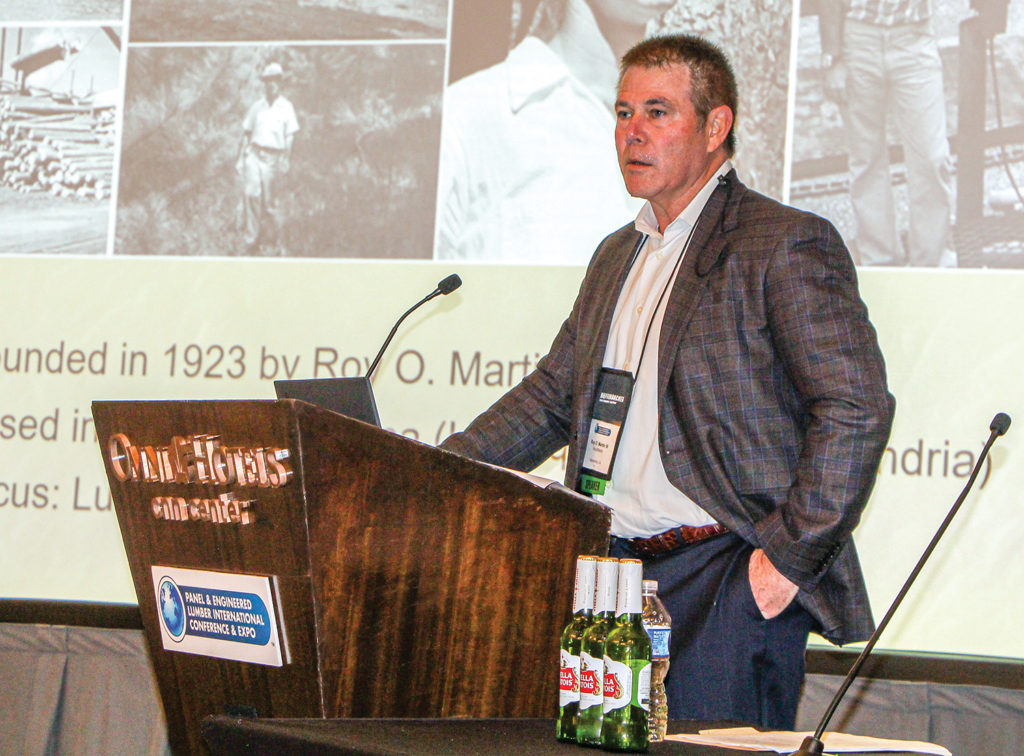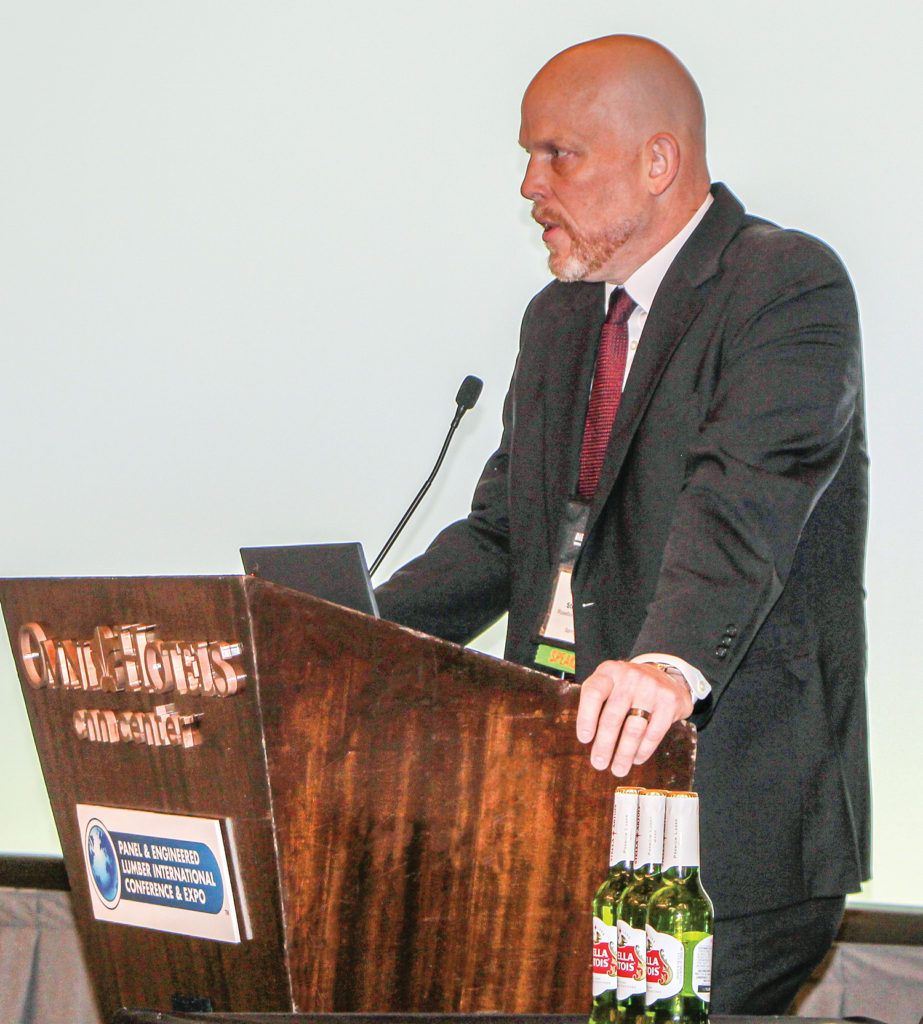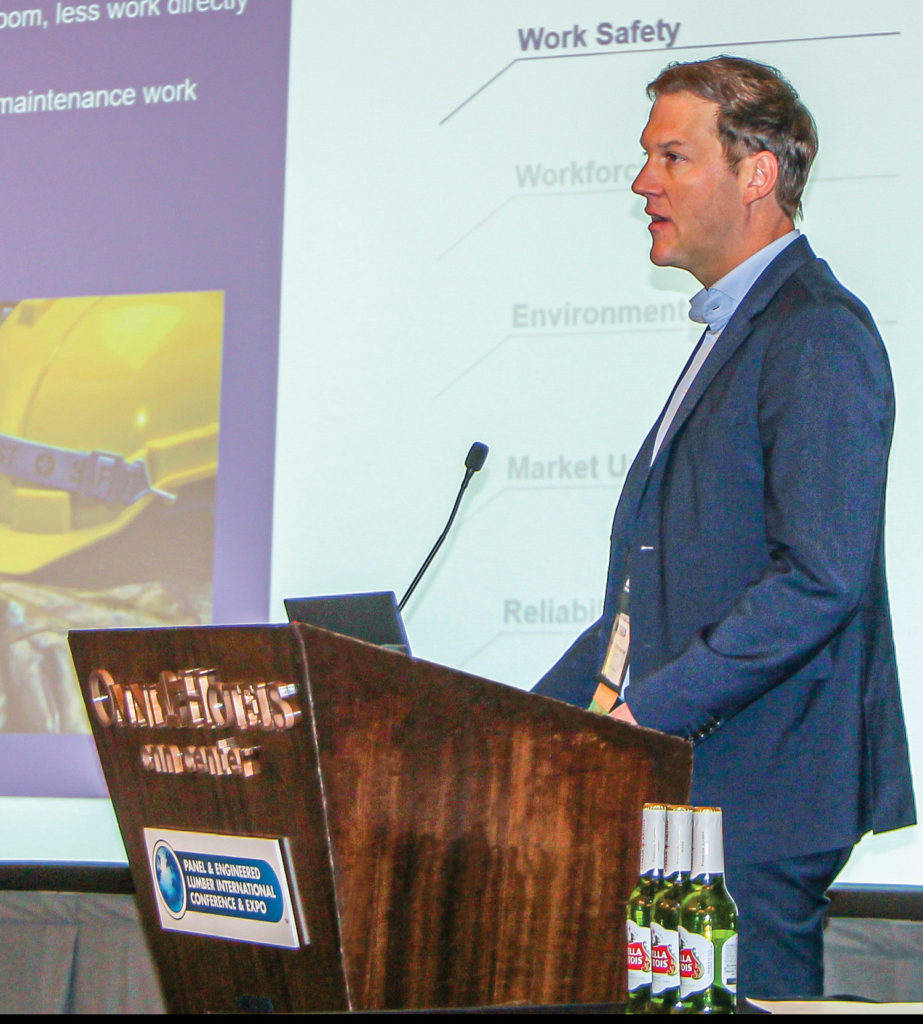PELICE 2024 Covers The Bases & Then Some: Martin, Gray, Dieffenbacher Start It Off
 The ninth Panel & Engineered Lumber International Conference & Expo (PELICE) set a participation record with 516 industry professionals (producers, equipment representatives, consultants, etc.) on site March 14-15 in the Grand Ballroom North of the Omni Atlanta Hotel at Centennial Park in Atlanta, Ga.
The ninth Panel & Engineered Lumber International Conference & Expo (PELICE) set a participation record with 516 industry professionals (producers, equipment representatives, consultants, etc.) on site March 14-15 in the Grand Ballroom North of the Omni Atlanta Hotel at Centennial Park in Atlanta, Ga.
Approximately 30 mill-producer companies from both the structural and non-structural wood products segments sent personnel to take in 35 presentations, comb the aisles of 100 exhibitor technology companies and enjoy the ample food festivities.
Many equipment and mill companies took advantage of the gathering to conduct private meetings around the conference. The conference is unique in that it caters to both the structural and non-structural wood products segments.
One of the most talked-about projects has been RoyOMartin’s new OSB plant in Corrigan, Texas, which is starting up and is the company’s second OSB plant on-site at Corrigan, with the first one coming up in 2018. But the leadoff speaker of PELICE, Roy O. Martin, III, chairman and CEO, discussed a much bigger picture: Navigating change while preserving a culture of excellence, and specifically looking at what will change and what should not change for a company that turned 100 years old in 2023.
 Martin noted that the company remains 100% family-owned and that the past decade has been its “golden decade” as evidenced by the expansion into East Texas and the modernization of their plywood facility in Chopin, La. “The late Jonathan Martin and I were expected to drive the company into the ground as many third-generation owners do, but I am pleased to say that is not the case,” Martin said. “I firmly believe we are entering our second century of business better managed, safer, better prepared financially and more modern than at any other time in company history. We are built to last.”
Martin noted that the company remains 100% family-owned and that the past decade has been its “golden decade” as evidenced by the expansion into East Texas and the modernization of their plywood facility in Chopin, La. “The late Jonathan Martin and I were expected to drive the company into the ground as many third-generation owners do, but I am pleased to say that is not the case,” Martin said. “I firmly believe we are entering our second century of business better managed, safer, better prepared financially and more modern than at any other time in company history. We are built to last.”
Martin said he was proud of the company’s employee benefits, including a medical home staffed by an MD, three NPs and a nutritionist, a company pharmacy, and each plant has one or two registered nurses for employees and their dependents. He said their profit-sharing plan has contributed on average an amount equal to 25% of eligible wages each year for the past four years, though he expects that to soften a little bit.
Noting that he is on the 18th fairway of his career, Martin asked: “How do we transition to a family owned, professionally managed and ethically run company for the next 100 years without me or a Martin as CEO?”
He pointed to failures of several well-known operations such as Circuit City that were supposedly “built to last.” What happened to them? “These companies were over expanded and over leveraged,” Martin said. “Yes, ROI to investors is much higher if you are leveraged eight to one as long as you have no problem making a profit off the leverage, the economy never turns down, foreign competition never hurts business and so on.”
He acknowledged that even the best of companies with the best of business plans can go awry when black swan events like the Great Recession hit, though he said RoyOMartin was able to run 24/7 with no market downtime during the Great Recession because “We maintained a ‘good’ balance sheet and gave ‘ample’ distributions to shareholders. Private equity style distributions that leave no equity in the company is not a strategy for sustainability.”
There’s Lesson 1, Martin said: “Maintain a fortress balance sheet for our commodity business that is highly cyclical. This includes disciplined and thoughtful capital expenditures and adequate but measured shareholder distributions.”
Martin said another metamorphosis in manufacturing has begun: computer-controlled manufacturing lines using the best practices of specific product manufacturing memorialized in software that uses digital history of prior events to better optimize future system controls and actions—known as artificial intelligence. “Get on board or get left behind,” Martin said.
He used the analogy of Kodak, the inventor of the digital camera, but which refused to market the idea thinking it would take away from the film business. Digital cameras did reduce the film market to rubble, Martin said, but someone else besides Kodak became dominant in the digital business. “If technology changes you must reinvent yourself,” he said.
Martin said AI will transform the manufacturing process and that vendors must lead this change, “but be wary of trying to sell systems that are slower and have less quality than current legacy systems. We as manufacturers do not want to invest in production systems just to get rid of jobs. The systems must be faster, more reliable and have better quality than the manual systems they replace. Many of the current systems for sale do not meet this standard.”
There’s Lesson II, Martin said: “Maintain the liquidity and management innovation to intelligently modernize facilities (including software) that increase productivity and boost the efficient use of natural resources.”
Martin said RoyOMartin, which has 1,400 “team members and leaders,” remains first and foremost a people business. He pointed to General Electric as a company where family values went out the corporate door. “They did not put their people first. They started moving managers around the globe at a reckless pace, setting unrealistic expectations for training time.”
Martin said ROM strives to give employees a culture of family, complemented with world-class benefits, and a safe, clean and inviting workplace. He pointed to several safety recognitions their operations have achieved. He said RoyOMartin provides a scholarship to any employee-dependent who goes to a public university or technical college in Texas and Louisiana. It’s part of the company’s effort to provide lifelong careers and improve the quality of life for employee families.
There’s Lesson III, Martin said: “ROM should continue to be the employer of choice and vendor of choice wherever we operate. We don’t just grow trees, we grow people.”
Martin noted they have added 200,000 acres to their timberland base in the past 20 years and today maintain 550,000 acres and manage another 160,000 acres in Louisiana and Texas. “The productivity of these tracts over the past 20 years is astounding,” he said, pointing as an example to the Western Gulf Tree Improvement program sponsored by Texas A&M to get the correct seedlings for the soil types.
Forestlands are the buffer for the highly volatile commodity business and a constant and predictable part of the shareholder return, he said.
Lesson IV: “Sustain all of our natural resources given to us by God.”
Martin mentioned the first history book written about the company in 1960 by Roy O. Martin, Sr., called “Life by the Board Foot.” “The next hundred years for RoyOMartin will involve change, but some things must stay the same for our future success. ‘Life by the Board Foot’ enters another chapter.”
 Stuart Gray, who was named president and CEO of Roseburg last year, addressed the company’s successful, 88-year-old history in his talk entitled “Looking Back to Look Forward.” He pointed to a values-based culture, vertical integration, strategic diversification, financial ingenuity, a long-term perspective, and innovation as reasons the Oregon-headquartered company has continued to thrive.
Stuart Gray, who was named president and CEO of Roseburg last year, addressed the company’s successful, 88-year-old history in his talk entitled “Looking Back to Look Forward.” He pointed to a values-based culture, vertical integration, strategic diversification, financial ingenuity, a long-term perspective, and innovation as reasons the Oregon-headquartered company has continued to thrive.
He said the company has always focused on “making lives better from the ground up,” with the ingredients of safety, a handshake integrity and a drive to win with “sawdust in the veins.”
Gray, frequently citing the business and team management writings of author Patrick Lencioni, said the ideal Roseburg team player is humble—someone who is more concerned with the success of the team than with getting credit for their own contribution; hungry—with a desire to work hard and do whatever is necessary to help the team succeed; and smart—“This is not about being intelligent,” Gray said, “but rather about being wise in dealing with people.”
Gray said Roseburg emphasizes responsibility-centered leadership, with front-line team members playing crucial roles along with management in vision and direction, and implementation
Gray read a passage from Lencioni: “If we can restore the collective attitude that leadership is meant to be a joyfully difficult and selfless responsibility, I am convinced that we will see companies become more successful, employees more engaged and fulfilled, and society more optimistic and hopeful. Perhaps people will stop using the term ‘servant leadership’ altogether, because everyone will understand that it is the only valid kind.”
He addressed the five behaviors of Roseburg’s cohesive team model: trust, conflict, commitment, accountability and results, and pointed to the company’s values-based culture that takes care of its team members and its customers. “Great relationship with team members and customers drive great results.”
He reviewed Roseburg’s integrated model of Timberlands and Manufacturing, and noted that in the past two decades Roseburg has expanded from the company’s traditional base in the Northwest to the Eastern and Southern U.S. and Canada, supported by new plants, product diversification and product sales share enhancements.
He pointed to the company’s $1 billion strategic investments plan, including a new sawmill that recently started up in North Carolina (Roanoke Valley Lumber), a new LVL plant in operation in South Carolina, new MDF plant and associated components plant under construction in Dillard, Ore. and several modernization projects ongoing in plywood facilities in Oregon.
Echoing some of the thoughts of Martin, Gray said Roseburg is preparing now for the future with enhancements in technology and automation, while remaining equally committed to its employee culture. He described the Roanoke Valley Lumber Work System as “The right people in the right roles driving the right behavior.”
 Continuing the theme of history, culture, digitalization and sustainability was Christian Dieffenbacher, CEO of Germany-based Dieffenbacher, with his talk “Future Oriented by Tradition.” The company, which is a major supplier to the new Martco OSB plant, turned 150 years old last year and has had a major presence in North America for more than 40 years, first with a production site in Canada and since 2012 with a subsidiary in Georgia. It remains family-owned and employs 1,850 worldwide, while serving four markets: wood-based panels, forming, recycling and energy.
Continuing the theme of history, culture, digitalization and sustainability was Christian Dieffenbacher, CEO of Germany-based Dieffenbacher, with his talk “Future Oriented by Tradition.” The company, which is a major supplier to the new Martco OSB plant, turned 150 years old last year and has had a major presence in North America for more than 40 years, first with a production site in Canada and since 2012 with a subsidiary in Georgia. It remains family-owned and employs 1,850 worldwide, while serving four markets: wood-based panels, forming, recycling and energy.
Dieffenbacher addressed “megatrends of sustainability and digitalization.” He explained that sustainability to Dieffenbacher deals with environmental, social, and governance (ESG), and that is strikes a balance between environmental protection, social equity and economic viability.
The company emphasizes “green locations” and “green products,” the former meaning they strive to reduce carbon footprint at its headquarters and subsidiaries, while sustainability is an essential factor in the development of new products with a goal to either reduce emissions or reduce the consumption of raw materials in the process. “EVORIS is continuously being developed, so this is just the beginning of digitalization in the wood-based panels industry,” he said. “The possibilities are almost unlimited, with the vision of a self-optimizing production plant.”
EVORIS addresses the multiple challenges of the North American market, such as safety—by shifting away from the plant itself to the safer control room, and with less unplanned downtime and related repair and maintenance work; workforce—a digitalized plant is easier to operate, requiring fewer staff while creating better working conditions and more participation; environmental concerns—by means of their Quality Prediction and Anomaly Detection app to achieve optimum material consumption and saving not only on raw materials also energy and CO2 emissions; market uncertainty—providing a competitive edge through less and shorter downtime, more efficient and cost-optimized production, increased speed and output and improved panel quality.
In addition to “megatrends” of digitalization and sustainability, Dieffenbacher sees trends toward fewer new plants in favor of more targeted modernizations and new panel types, the latter including wood fiber insulation board, fine OSB, “super” particleboard and straw-based particleboard, and continuous plywood (conti-plywood) production, as well as date palm OSB and MDF.
“More than ever we have learned in recent years that you never know what the future holds,” he said. “We have proven time and again in our more than 150 years how well we can adapt to changing circumstance. And I can promise you today we will continue to do this for at least the next 150 years and always together with you as our partners.”
Latest News
Walmart Home Office Installs Mercer CLT, Glulam
Walmart Home Office Installs Mercer CLT, Glulam Mercer Mass Timber (MMT), a manufacturer of timber building materials and a subsidiary of Mercer International Inc., has announced the completion of a key role in the construction of Walmart’s new Home Office in...
TimberHP Expects Long-Term Success
TimberHP Expects Long-Term SuccessTimberHP, a Maine-based manufacturer of wood fiber insulation, announced that it has filed a voluntary, pre-negotiated Chapter 11 plan of reorganization in the U.S. Bankruptcy Court for the District of Delaware. The plan, according to...
Boise Cascade Invests $140 Million In Three Facilities
Boise Cascade Invests $140 Million In Three FacilitiesBoise Cascade shared additional details regarding its previously announced $140-million investments in its Alabama and Louisiana facilities. The upgrades will support the company’s EWP growth strategy. ...
Find Us On Social
Newsletter
The monthly Panel World Industry Newsletter reaches over 3,000 who represent primary panel production operations.
Subscribe/Renew
Panel World is delivered six times per year to North American and international professionals, who represent primary panel production operations. Subscriptions are FREE to qualified individuals.
Advertise
Complete the online form so we can direct you to the appropriate Sales Representative. Contact us today!
